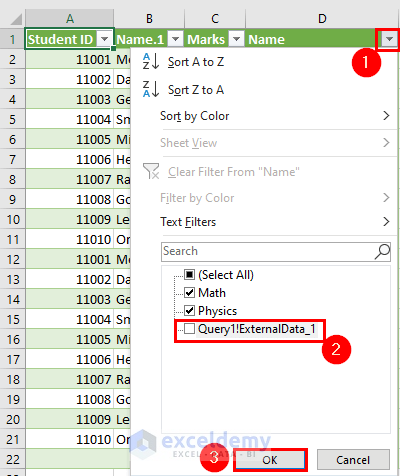5 Ways to Merge Excel Sheets by Column

Merging data from multiple Excel sheets into a single file can often be an exercise in patience, especially when dealing with large datasets or complex spreadsheet structures. However, with the right tools and techniques, this task can be streamlined significantly, saving time and reducing errors. In this comprehensive guide, we will explore five effective methods to merge Excel sheets by column, ensuring your data remains intact and structured for optimal analysis.
Method 1: Using Excel’s Built-In Functions

Excel offers several built-in functions that can help in merging data:
- VLOOKUP: Ideal for merging columns from two or more sheets into one by looking up a key value. Here’s how you can do it:
- Open your primary Excel workbook.
- In the sheet where you want the merged data, insert a new column for the data you want to retrieve.
- Use the VLOOKUP formula:
=VLOOKUP(A2, Sheet2!A:B, 2, FALSE)to fetch the data from Sheet2’s column B based on the matching value in column A of the primary sheet. - INDEX/MATCH: Similar to VLOOKUP but more versatile and can work horizontally or vertically.
- Set up your primary sheet.
- Write an INDEX/MATCH formula to retrieve data:
=INDEX(Sheet2!A:B, MATCH(A2, Sheet2!A:A, 0), 2).
👆 Note: Ensure the lookup value exists in both sheets to prevent errors.
Method 2: Power Query


Power Query, an Excel add-in, provides powerful data transformation capabilities:
- Launch Power Query by going to
Data > Get & Transform Data > From Table/Range. - Select your sheets to combine and click
Append QueriesorMerge Queriesbased on your need. - Match the columns you want to merge and proceed with the query transformation.
👀 Note: Power Query retains data transformations for future updates, making it a preferred choice for recurring merges.
Method 3: VBA Macro

Visual Basic for Applications (VBA) can automate complex tasks like merging sheets:
- Open the VBA editor (Alt+F11).
- Insert a new module and write a VBA script to loop through workbooks and sheets, merging data as needed.
- Here's a basic example:
Sub MergeSheetsByColumn()
Dim wb As Workbook
Dim wsSource As Worksheet, wsDestination As Worksheet
Dim rngDestination As Range
Dim lastRowSource As Long, lastRowDestination As Long
Dim mergeColumn As String
' Set the destination sheet
Set wsDestination = ThisWorkbook.Sheets("Sheet1")
Set rngDestination = wsDestination.Cells(wsDestination.Rows.Count, 1).End(xlUp).Offset(1, 0)
mergeColumn = "A" ' Change this to the column you want to merge by
' Loop through all open workbooks
For Each wb In Workbooks
For Each wsSource In wb.Sheets
If wsSource.Name <> wsDestination.Name Then
lastRowSource = wsSource.Cells(wsSource.Rows.Count, mergeColumn).End(xlUp).Row
lastRowDestination = wsDestination.Cells(wsDestination.Rows.Count, mergeColumn).End(xlUp).Row
wsSource.Range(mergeColumn & "2:" & mergeColumn & lastRowSource).Copy
rngDestination.PasteSpecial xlPasteValuesAndNumberFormats
Set rngDestination = rngDestination.Offset(lastRowDestination, 0)
End If
Next wsSource
Next wb
Application.CutCopyMode = False
End Sub
🎯 Note: VBA macros are great for automation but require Excel knowledge and can be less user-friendly for those without coding skills.
Method 4: Using Consolidate Function

Excel's Data > Consolidate feature can merge sheets by column:
- Go to the worksheet where you want to combine data.
- Select
Data > Consolidate. - Choose the function (e.g., Sum) and select the ranges from each sheet to consolidate.
- Ensure you check
Link to source datafor dynamic updates.
💡 Note: Consolidate works best for numeric data and may not be suitable for merging text or complex data.
Method 5: External Tools

Consider external software or add-ins if Excel's features are not sufficient:
- Tools like Ablebits Data Merge or Kutools can simplify the process:
- Download and install the software.
- Select your sheets and columns to merge using the tool's interface.
- Process the merge with one click.
💾 Note: External tools can be cost-effective but might require learning new interfaces.
In summary, merging Excel sheets by column involves various methods from simple built-in functions to sophisticated tools and macros. Each method has its advantages, and your choice will depend on the complexity of your data, your comfort with Excel, and whether you need the process to be repeatable or one-time. The key is to find a balance between efficiency and the level of control you need over the merging process. Remember, no matter the method you choose, always back up your data before merging to avoid any data loss or corruption.
Can I merge Excel sheets without a common column?

+
Yes, you can use Power Query to append data vertically or the Consolidate function for numeric data, but you’ll lose the context of which sheet the data came from.
What should I do if I need to merge multiple sheets with different structures?

+
Using Power Query to transform data or writing a custom VBA macro can be effective for handling sheets with different structures.
How can I automatically update the merged data?

+
Link your data source using Power Query or use VBA to automate updates to ensure the merged data reflects changes in the source sheets.